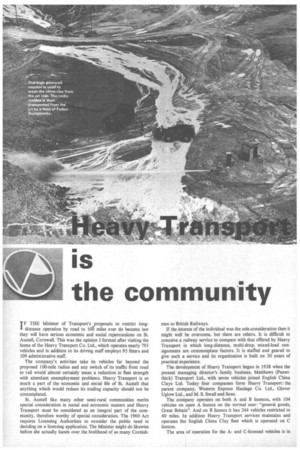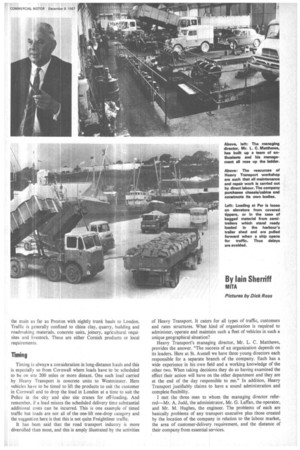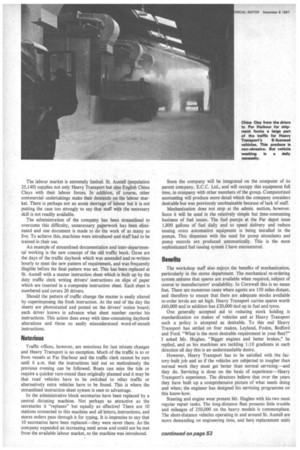is the community
Page 48

Page 49

Page 50

If you've noticed an error in this article please click here to report it so we can fix it.
By lain Sherriff nri ITA IF THE Minister of Transport's _proposals to restrict long-11distance operation by road to 100 miles ever do become law they will have serious economic and social repercussions on St. Austell, Cornwall. This was the opinion I formed after visiting the home of the Heavy Transport Co. Ltd., which operates nearly 793 vehicles and in addition to its driving staff employs 95 fitters and 109 administrative staff.
The company's activities take its vehicles far beyond the proposed 100-mile radius and any switch of its traffic from road to rail would almost certainly mean a reduction in fleet strength with attendant unemployment problems. Heavy Transport is so much a part of the economic and social life of St. Austell that anything which would reduce its trading capacity should not be contemplated.
St. Austell like many other semi-rural communities merits special consideration in social and economic matters and Heavy Transport must be considered as an integral part of the community, therefore worthy of special consideration. The 1960 Act requires Licensing Authorities to consider the public need in deciding on a licensing application. The Minister might do likewise before she actually hands over the livelihood of so many Cornish
men to British Railways.
If the interest of the individual was the sole .consideration then it might well be overcome, but there are others. It is difficult to conceive a railway service to compare with that offered by Heavy Transport in which long-distance, multi-drop, mixed-load consignments are commonplace factors. It is staffed and geared to give such a service and its organization is built on 30 years of practical experience.
The development of Heavy Transport began in 1938 when the present managing director's family business, Matthews (Penwithick) Transport Ltd., with seven vehicles joined English China Clays Ltd. Today four companies form Heavy Transport: the parent company, Western Express Haulage Co. Ltd., Glover Uglow Ltd., and M. S. Small and Sons.
The company operates on both A and B licences, with 104 vehicles on open A licence on the normal user: "general goods, Great Britai ". And on B licence it has 244 vehicles restricted to 40 miles. I addition Heavy Transport services maintains and operates th English China Clay fleet which is operated on C licence.
The area of operation for the Aand C-licensed vehicles is in the main as far as Preston with nightly trunk hauls to London. Traffic is generally confined to china clay, quarry, building and roadmaking materials, concrete units, joinery, agricultural requisites and livestock. These are either Cornish products or local requirements.
liming
Timing is always a consideration in long-distance hauls and this is especially so from Cornwall where loads have to be scheduled to be on site 200 miles or more distant. One such load carried by Heavy Transport is concrete units to Westminster. Here vehicles have to be timed to lift the products to suit the customer in Cornwall and to drop the load in London at a time to suit the Police in the city and also site cranes for off-loading. And remember, if a load misses the scheduled delivery time substantial additional costs can be incurred. This is one example of timed traffic but loads are not all of the one-lift one-drop category and the suggestion here is that this is not quite Freightliner traffic.
It has been said that the road transport industry is more diversified than most, and this is amply illustrated by the activities of Heavy Transport. It caters for all types of traffic, customers and rates structures. What kind of organization is required to administer, operate and maintain such a fleet of vehicles in such a unique geographical situation?
Heavy Transport's managing director, Mr. L. C. Matthews, provides the answer. "The success of an organization depends on its leaders. Here at St. Austell we have three young directors each responsible for a separate branch of the company. Each has a wide experience in his own field and a working knowledge of the other two. When taking decisions they do so having examined the effect their action will have on the other department and they are at the end of the day responsible to me." In addition, Heavy Transport justifiably claims to have a sound administration and complete flexibility.
I met the three men to whom the managing director referred—Mr. A. Judd, the administrator, Mr. G. Laffan, the operator, and Mr. M. Hughes, the engineer. The problems of each are basically problems of any transport executive plus those created by the location of the company in relation to the labour market, the area of customer-delivery requirement, and the distance of their company from essential services.
The labour market is extremely limited. St. Austell (population 25,140) supplies not only Heavy Transport but also English China Clays with their labour forceti in addition, of course, other commercial undertakings make their demands on the labour market. There is perhaps not an acute shortage of labour but it is not putting the case too strongly to say that staff with the necessary skill is not readily available.
The administration of the company has been streamlined to overcome this difficulty, unnecessary paperwork has been eliminated and one document is made to do the work of as many as five. To achieve this, machines were introduced and staff had to be trained in their use.
An example of streamlined documentation and inter-departmental working is the new concept of the old traffic book. Gone are the days of the traffic daybook which was amended and re-written hourly to meet the new pattern of requirement, and was frequently illegible before the final pattern was set This has been replaced at St. Austell with a master instruction sheet which is built up by the duty traffic clerk writing drivers' instructions on slips of paper which are inserted in a composite instruction sheet. Each sheet is numbered and covers 20 drivers.
Should the pattern of traffic change the master is easily altered by superimposing the fresh instruction. At the end of the day the sheets are photostatted and posted on the drivers' notice board; each driver knows in advance what sheet number carries his instructions. This action does away with time-consuming daybook alterations and those so easily misunderstood word-of-mouth instructions.
Notorious
Traffic offices, however, are notorious for last minute changes and Heavy Transport is no exception. Much of the traffic is to or from vessels at Par Harbour and the traffic clerk cannot be sure until 6 a.m. that the instructions laid out so meticulously the previous evening can be followed. Boats can miss the tide or require a quicker turn-round than originally planned and it may be that road vehicles have to be switched to other traffic or alternatively extra vehicles have to be found. This is where the streamlined instruction sheet system is seen to advantage.
In the administrative block secretaries have been replaced by a central dictating machine. Not perhaps as attractive as the secretaries it "replaces" but equally as effective! There are 10 stations connected to this machine and all letters, instructions, and stores orders pass through it for typing. It is imprecise to say that 10 secretaries have been replaced—they were never there. As the company expanded an increasing need arose and could not be met from the available labour market, so the machine was introduced. Soon the company will be integrated on the computer of its parent company, E.C.C. Ltd., and will occupy this equipment full time, in company with other members of the group. Computerized accounting will produce more detail which the company considers desirable but was previously unobtainable because of lack of staff.
Mechanization does not stop at the admin. section, however. Soon it will be used in the relatively simple but time-consuming business of fuel issues. The fuel pumps at the Par depot issue 1,800 gallons of fuel daily and to speed delivery and reduce issuing costs automation equipment is being installed in the pumps. This dispenses with the need for pump attendants and pump records are produced automatically. This is the most sophisticated fuel issuing system I have encountered.
Benefits
The workshop staff also enjoys the benefits of mechanization, particularly in the stores department. The mechanical re-ordering system ensures that spares are available when required, subject of course to manufacturers' availability. In Cornwall this is no mean feat. There are numerous cases where agents are 150 miles distant, and therefore to ensure that there are adequate stocks available re-order levels are set high. Heavy Transport carries spares worth £60,000 and in addition has £20,000 tied up in fuel and tyres.
One generally accepted aid to reducing stock holding is standardization on makes of vehicles and at Heavy Transport such a policy is accepted as desirable. To this end Heavy Transport has settled on four makes, Leyland, Foden, Bedford and Ford. "What is the most desirable requirement in your fleet?" I asked Mr. Hughes. "Bigger engines and better brakes," he replied, and as his machines are tackling 1:10 gradients in each direction all day this is an understandable desire.
However, Heavy Transport has to be satisfied with the factory-built job and so if the vehicles are subjected to tougher than normal work they must get better than normal servicing—and they do. Servicing is done on the basis of experience—Heavy Transport's experience. The directors believe that over the years they have built up a comprehensive picture of what needs doing and when; the engineer has designed his servicing programme on this know-how.
Steering and engine wear present Mr. Hughes with his two most regular repair tasks. The long-distance fleet presents little trouble and mileages of 250,000 on the heavy, models is commonplace. The short-distance vehicles operating in and around St. Austell are more demanding on engineering time, and here replacement units








































































































